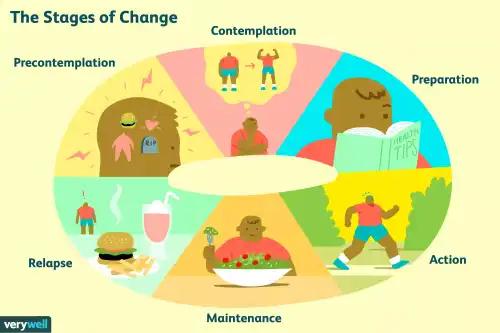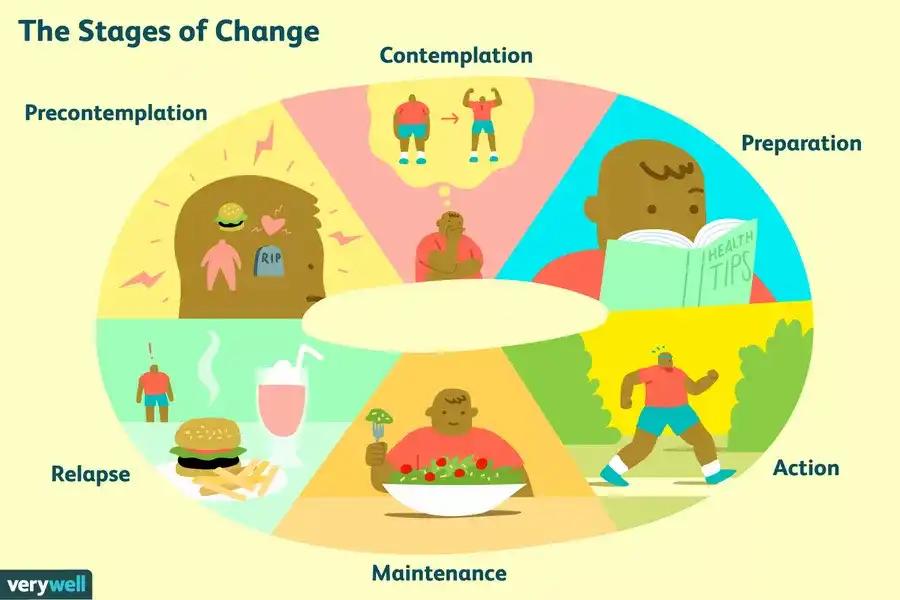Learn more about personaldevelopment with this collection
How to start a successful business
How to build a strong team
How to market your business
Making a change in behaviour
Making a lasting change in behaviour can be very difficult. It requires a commitment of time, effort, and emotion.
Whether you want to lose weight, or accomplish another goal, there is no single solution that works for everyone. During this period, many people become discouraged and give up. The key is to try other techniques and find new ways to stay motivated.
334
2.96K reads
Elements in changing a behaviour
To make a successful change, you need to understand three elements in changing a behaviour:
- Readiness to change: Having the resources and knowledge to make a lasting change.
- Barriers to change: Finding out what is preventing you from changing.
- Likelihood of relapse: Consider what might trigger a return to a former behaviour.
348
2.3K reads
Stages of the Change Model
The best-known approach to change is the Stages of Change or Transtheoretical Model, that was introduced in the 1970s as a way to help people quit smoking.
In this model, change happens slowly, and relapses are an inevitable part of the process. It has 6 stages:
- Precontemplation
- Contemplation
- Preparation
- Action
- Maintenance
- Relapse.
360
2.21K reads
Precontemplating change
During this stage of change, people are ignorant of the problem, claiming their behaviour is not a problem. You may feel resigned to your current state or think you have no control over your behaviour.
Strategies involve asking yourself some questions:
- Have you ever tried to change this behaviour?
- How do you realise that you have a problem?
- What would have to happen for you to think your behaviour is a problem?
318
1.69K reads
Contemplating change
People become increasingly aware of the potential benefits of making a change, but the costs to make the change creates conflict and uncertainty that can last months or even years. People in this stage view change as a process of giving something up rather than a means of gain.
Important questions to consider:
- Why do you want to change?
- Is there anything preventing you from changing?
- What are some things that could help you make this change?
309
1.39K reads
Preparing for change
During this stage of change, you might begin making small changes to prepare for a larger change. For example, if losing weight is your goal, you might switch to lower-fat foods or join a health club.
Some steps you can take to improve your chances of successfully making a change:
- Gather as much information as you can about ways to change your behaviour.
- Prepare a list of motivating statements.
- Write down your goals.
- Find resources such as support groups or friends who can offer advice.
310
1.27K reads
Acting for change
During this stage of change, people begin taking direct action in order to accomplish their goals. But resolutions may fail because the previous steps have not been given enough attention.
- If you are taking action towards achieving your goal, reward yourself for any positive steps you take.
- Review your motivations, resources, and progress to refresh your commitment and belief in your abilities.
307
1.31K reads
Change: the maintenance stage
This stage of change involves successfully avoiding former behaviours and continuing with the new behaviours.
If you are trying to maintain a new behaviour:
- Look for ways to avoid temptation.
- Try to replace old habits with positive actions.
- Reward yourself when you successfully avoid a relapse.
308
1.32K reads
Change and relapse
Relapses are common in any behaviour change. You may experience feelings of failure, disappointment, and frustration. Don't let these setbacks undermine your self-confidence. Instead, take a good look at why it happened. What triggered the relapse? How can you avoid these triggers?
The best way forward is to start again with the preparation, action, or maintenance stages of behaviour change.
306
1.45K reads
CURATED BY
More like this
Read & Learn
20x Faster
without
deepstash
with
deepstash
with
deepstash
Access to 200,000+ ideas
—
Access to the mobile app
—
Unlimited idea saving & library
—
—
Unlimited history
—
—
Unlimited listening to ideas
—
—
Downloading & offline access
—
—
Personalized recommendations
—
—
Supercharge your mind with one idea per day
Enter your email and spend 1 minute every day to learn something new.
I agree to receive email updates

